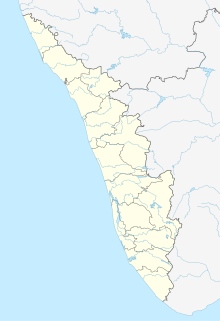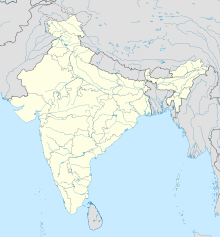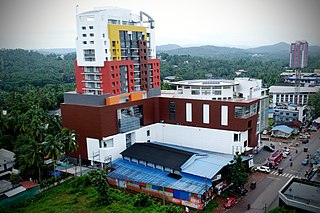
Malappuram, is one of the 14 districts in the Indian state of Kerala, with a coastline of 70 km (43 mi). The most populous district of Kerala, Malappuram is home to around 13% of the total population of the state. The district was formed on 16 June 1969, spanning an area of about 3,554 km2 (1,372 sq mi). It is the third-largest district of Kerala by area. It is bounded by Western Ghats and the Arabian Sea on either side. The district is divided into seven Taluks: Eranad, Kondotty, Nilambur, Perinthalmanna, Ponnani, Tirur, and Tirurangadi.

Mappila Muslim, in general, is a member of the Muslim community of same name found predominantly in Kerala and Lakshadweep Islands, in southern India. Muslims of Kerala make up 26.56% of the population of the state (2011), and as a religious group they are the second largest group after Hindus (54.73%). Mappilas share the common language of Malayalam with the other religious communities of Kerala.

Manjeri is a major town and municipality in Malappuram district, Kerala, India. It is the fourth-most populous municipality in state. It is situated 23 kilometres (14 mi) southeast to Karipur International Airport and 13 kilometres (8.1 mi) northeast to Malappuram, the district headquarters, and forms a part of Malappuram metropolitan area. It is one of the major commercial towns under the Malappuram urban agglomeration and serves as the headquarters of Eranad Taluk. Manjeri Municipality is a Local Self Government Institution with a jurisdiction of three villages namely Manjeri, Payyanad, and Narukara.

Malappuram is a city and the headquarters of the Malappuram district in Kerala, India. It is the 4th largest urban agglomeration in Kerala and the 20th largest in India. The city is spread over an area of 158.20 km2 (61.08 sq mi) including the surrounding suburban areas. The first municipality in the district formed in 1970, Malappuram serves as the administrative headquarters of Malappuram district. Divided into 40 electoral wards, the city has a population density of 4,800 per square kilometre. According to the 2011 census, the Malappuram metropolitan area is the fourth largest urban agglomeration in Kerala after Kochi, Calicut, and Thrissur urban areas and the 20th largest in India with a total population of 3 million. It is the fastest growing city in the world with a 44.1% urban growth between 2015 and 2020 as per the survey conducted by Economist Intelligence Unit (EIU) based on the urban area growth during January 2020. Malappuram is situated 54 km southeast of Calicut and 90 km northwest of Palakkad. It is the first Indian municipal body to provide free Wi-Fi connectivity to its entire residents. Malappuram is also the first Indian municipal body to achieve the International Organization for Standardization certificate. It is also the first complaint-free municipality in the state.
Mappila songs are a folklore Muslim song genre rendered to lyrics, within a melodic framework (Ishal), in Arabi Malayalam by the Mappilas of the Malabar region in Kerala, India. Mappila songs have a distinct cultural identity, while at the same time remain closely linked to the cultural practices of Kerala.
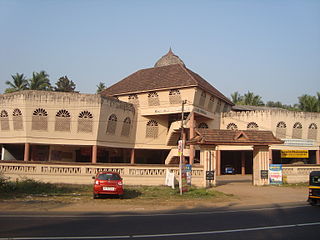
Moyinkutty Vaidyar (1852–1892), often referred to as Mahakavi, is historically considered one of the most renowned poets of the Mappila pattu genre of Malayalam language.
E. Moidu Moulavi (1886–1995) was an Indian National Congress (INC) leader,Islamic scholar, one of the Salafi movements reformers, scholar and educationist of Malabar District, born at Maranchery in Ponnani. He was a supporter of the Islahi movement in Kerala and a co-worker with leaders like K. M. Maulavi, Sayyid Sanaulla Makti Thangal, Mohammed Abdul Rahiman and K. M. Seethi Sahib

Pookkottoor is a village in Eranad taluk, and a suburb of Malappuram, Kerala, India. It is on National Highway 966, and there is a state road from the town to Manjeri.

Kottakkunnu is a hill station in Malappuram district of Kerala state, India. Widely known as Kotta Kunnu, it is situated at a height of 915 metres and is a popular tourist destination in the state of Kerala located at Malappuram.
Nellikuth is a town in Manjeri Municipality in Malappuram district of Kerala, India. It is situated 8 km west to Manjeri and 16 km north west to the Malappuram, the district headquarters. It is one of the major place in Payyanad Village, in Eranad Taluk.
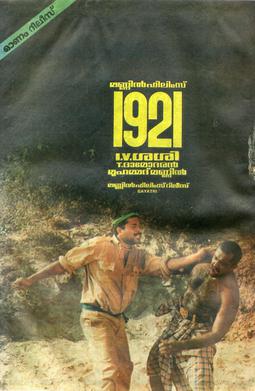
1921 is a 1988 Indian Malayalam-language war film written by T. Damodaran and directed by I. V. Sasi. The film has an ensemble cast including Mammootty, Madhu, Suresh Gopi, T. G. Ravi, Seema, Urvashi and Mukesh. Set during the 1921–22 Mappila Uprising in Madras Presidency, it tells the fictional story of Khader, a World War I veteran, who joins with the Mappila rebels during the Uprising.
Variyankunnath Kunjahammad Haji sometimes called Variyamkunnan was the most prominent leader of the war in Malabar against the British during the Malabar rebellion and founder of a parallel government, in Malabar. He was an Indian freedom fighter, opposer of the Jenmi system, and an ordinary member of the Khilafat movement.

The Malabar rebellion of 1921 started as a resistance against the British colonial rule in certain places in the southern part of old Malabar district of present-day Kerala. The popular uprising was also against the prevailing feudal system supposedly controlled by Hindus. During the rebellion, thousands of Hindus were murdered and forcibly converted to Islam.

Āli Musliyār was the leader of Malabar Rebellion, and a freedom fighter. Musliyār was the Imam of Tirurangadi Masjid from 1907 until his eventual execution at Coimbatore Prison for the allegation against him for calling to fight against British rule. He was an active orator of the Khilafat Movement in Malabar region.
Fazal Pookoya Thangal, also known as Sayyid Fadl and Fadl Pasha, was a Yemeni Islamic missionary and political activist who played a prominent role in the Mappila community of Kerala, India. He was the spiritual leader of Kerala Muslims as well as one of the pioneers of the Indian freedom movement. He belonged to a family of Sayyids who traced their lineage to Ali ibn Abi Talib through Mamburam Sayyid Alavi Mouladhavila. His father was Mamburam Sayyid Alavi Thangal, a Muslim mystic and political leader who had migrated from Hadramaut in Yemen to Malabar in 1798 CE to spread Islam. After his father's death in 1845 CE, he succeeded him as the spiritual leader of Kerala Muslims.
Malappuram is one of the 14 districts in the South Indian state of Kerala. The district has a unique and eventful history starting from pre-historic times. During the early medieval period, the district was the home to two of the four major kingdoms that ruled Kerala. Perumpadappu was the original hometown of the Kingdom of Cochin, which is also known as Perumbadappu Swaroopam, and Nediyiruppu was the original hometown of the Zamorin of Calicut, which is also known as Nediyiruppu Swaroopam. Besides, the original headquarters of the Palakkad Rajas were also at Athavanad in the district.
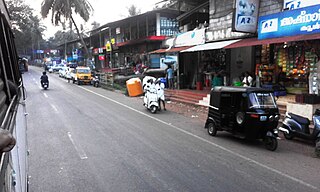
Valenchery is a small town in Morayur Gram panchayat in Malappuram in Malappuram district of state of Kerala. Valenchery is divided into four Areas, they are Village Road, Colony Road, Madrasa Road and Hilltop Area.Four Wards from Morayur Panchayath partly belongs to Valenchery. Nearest places are Valluvambram Junction, Mongam, Morayur, Arimbra and Pookkottur. Nearest tourist spot is Mini Ooty.

Kaathib Thayyil Mohammed Kutty Musliyar, popularly known as K. M. Moulavi or K. M. Maulavi, was an Indian revolutionary. He was a leader of the Indian independence movement, Khilafat Movement, Muslim League and Islahi Movement from Malabar district. He was a religious scholar who promoted modern education, the Malayalam language, and Muslim women's education. He worked to uplift the Mappila community after the Malabar rebellion.

The Tirurangadi Taluk Office, also known as Hajur Kacheri, is a historic building located in Tirurangadi Talk of Malappuram District in the Indian state of Kerala. It houses the Tirurangadi Taluk Office since the post-independence Malabar District or British-era Madras Presidency. The Taluk office, which was once the Hajur Kacheri (Huzur Office) under the British, was one of the major administrative centers of the British government in Malabar region. The building also functioned as the headquarters of a short-lived Khilafat government during the rebellion.
![puukkoottttuu[?] yuddhsmaark geerrrr arrvngkr.jpg](http://upload.wikimedia.org/wikipedia/commons/thumb/8/83/%E0%B4%AA%E0%B5%82%E0%B4%95%E0%B5%8D%E0%B4%95%E0%B5%8B%E0%B4%9F%E0%B5%8D%E0%B4%9F%E0%B5%82%E0%B5%BC_%E0%B4%AF%E0%B5%81%E0%B4%A6%E0%B5%8D%E0%B4%A7%E0%B4%B8%E0%B5%8D%E0%B4%AE%E0%B4%BE%E0%B4%B0%E0%B4%95_%E0%B4%97%E0%B5%87%E0%B4%B1%E0%B5%8D%E0%B4%B1%E0%B5%8D_%E0%B4%85%E0%B4%B1%E0%B4%B5%E0%B4%99%E0%B5%8D%E0%B4%95%E0%B4%B0.jpg/220px-%E0%B4%AA%E0%B5%82%E0%B4%95%E0%B5%8D%E0%B4%95%E0%B5%8B%E0%B4%9F%E0%B5%8D%E0%B4%9F%E0%B5%82%E0%B5%BC_%E0%B4%AF%E0%B5%81%E0%B4%A6%E0%B5%8D%E0%B4%A7%E0%B4%B8%E0%B5%8D%E0%B4%AE%E0%B4%BE%E0%B4%B0%E0%B4%95_%E0%B4%97%E0%B5%87%E0%B4%B1%E0%B5%8D%E0%B4%B1%E0%B5%8D_%E0%B4%85%E0%B4%B1%E0%B4%B5%E0%B4%99%E0%B5%8D%E0%B4%95%E0%B4%B0.jpg)
